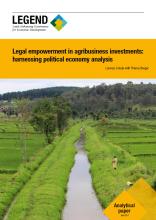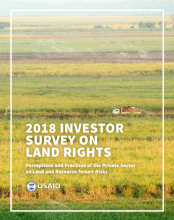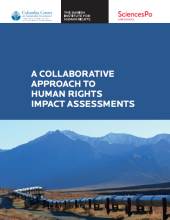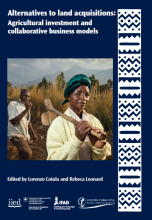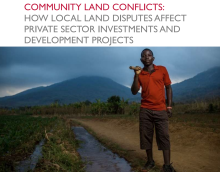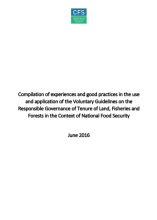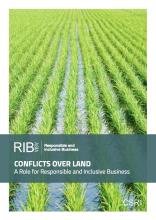Additional Resources
Legal empowerment in agribusiness investments: harnessing political economy analysis
This analytical paper explores how political economy analysis can help practitioners make sense of the issues, and distils insights from practical experience on how legal empowerment initiatives can rise to the challenge.
It is aimed at legal empowerment practioners and analysts.
2018 Investor Survey on Land Rights: Perceptions and Practices of the Private Sector on Land and Resource Tenure Risks
The USAID's Investor Survey on Land Rights aimed to provide a more systematic understanding of the drivers of tenure risk to land-based investments from the perspective of the private sector, and of how investors and operators assess, mitigate and are affected by such risks. The findings from the survey will provide readers with useful insights into the current treatment of land tenure risks in land-based investments.
A Collaborative Approach to Human Rights Impact Assessments
This paper provides guidance on how to conduct collaborative and participatory risk assessments, paying attention to the human rights of project-affected people. It was written for stakeholders who seek more effective strategies for investigating the human rights impacts of business projects or operations, and who wish to make their human rights impact assessments more inclusive and responsive, or who seek to encourage greater buy-in from other stakeholders.
Addressing legacy land issues in agribusiness investments
This Analytical Paper explores legacy land issues as they affect agribusiness investments in low- and middle-income countries.
Alternatives to land acquisitions: Agricultural investment and collaborative business models
This report presents experiences discussed at a workshop on the use of collaborative business models in agricultural investments, which aimed to facilitate the exchange of experiences and lesson and to generate lessons from local initiatives to be fed into international processes. The focus was on agriculture defined broadly to include agri-food, biofuels, timber plantations and other agricultural commodities. Experience from other sectors, such as tourism, was included to the extent that they provided insights for agricultural investments.
Background document on guidance to corporates on the practical application of the CFS Voluntary Guidelines on Land Tenure (VGGT)
The objective of this document is to guide the corporates and investors understand how to respect peoples’ ’‘tenure rights to land, fisheries and forest”,and ensure that communities have access to remedies ‘acceptable to both parties’ when such rights are impinged or such potential is recognized. It is organised in 5 chapters that (1) provides objectives and the context within which this Guidance to Corporates on the VGGT is to be comprehended, (2) describes current practices in the areas recognized as responsibilities of Corporates under the VGGT, (3)provides an overview of the existing codes in these key areas of corporate responsibilities under the VGGT vis- à-vis their perceived limitations, (4) deals with potential tenure governance issues and areas for intervention by business enterprises and investors, and (5) discusses key questions to implement or improve corporate performance in different themes of corporate responsibility.
Community Land Conflicts: How Local Land Disputes Affect Private Sector Investments and Development Projects
This report provides information on due diligence and effective conflict management through consultation in the context of community land conflicts. It identifies some key steps to follow to integrate community land conflict into enhanced project risk assessments.
Compilation of experiences and good practices in the use and application of the Voluntary Guidelines on the Responsible Governance of Tenure of Land, Fisheries and Forests in the Context of National Food Security
This document gathers a number of case studies on the use and application of the Voluntary Guidelines on the Responsible Governance of Tenure (VGGT) in a wide range of projects, and highlights successes in these experiences. For each project, it includes a description of and information on the approach adopted, and provides additonal resources for stakeholders interested in learning more about these projects.
Conflicts Over Land - A Role for Responsible and Inclusive Business
This briefing paper makes the case for proactive business engagement in respecting land rights and ensuring legal, fair and inclusive practices on land use, access to natural resources and equitable development opportunities. It outlines key challenges, provides an overview of existing instruments that can help companies address issues related to land, and points to practical entry points for improved business practices.
Emerging Corporate and Investor Practice to Support Community Land Rights. Case Studies from Malawi, Mozambique, and Malaysia
This report aims to illustrate how selected companies in Malawi, Mozambique and Malaysia are implementing commitments to international best practices on land rights. The companies referenced in this paper are in the process of developing and improving ways to address land tenure rights, and for this reason, the cases ought to be viewed as examples of emerging company experiences, which can contribute to establishing best practices. The case studies in this paper are not in-depth assessments, but rather convey company perspectives, without corroboration with communities’ or other actors’ points of view.


